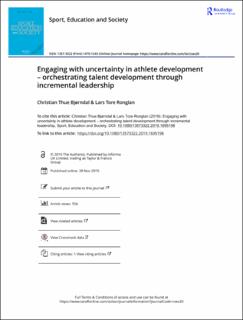| dc.description.abstract | The development of young athletes is a complex process characterised by dynamic changes and uncertainty [Abbott, A., Button, C., Pepping, G.-J., & Collins, D. (2005). Unnatural selection: Talent identification and development in sport. Nonlinear Dynamics, Psychology, and Life Sciences, 9(1), 61–88]. Talent development systems are characterised by a high level of uncertainty and unpredictability related to future outcomes [Phillips, E., Davids, K., Renshaw, I., & Portus, M. (2010). Expert performance in sport and the dynamics of talent development. Sports Medicine, 40(4), 271–283]. This complexity means that attempts to identify sporting talent and to predict who will eventually succeed have a low level of success [Johnston, K., Wattie, N., Schorer, J., & Baker, J. (2018). Talent identification in sport: A systematic review. Sports Medicine, 48(1), 97–109]. Research has challenged the trend of advocating formalised and normative systems of talent identification and development [Bailey, R., & Collins, D. (2013). The standard model of talent development and its discontents. Kinesiology Review, 2(4), 248– 259], and empirical research has identified different approaches to talent development [Bjørndal, C. T., Andersen, S. S., & Ronglan, L. T. (2017). Successful and unsuccessful transitions to the elite level: The youth national team pathways in Norwegian handball. International Journal of Sports Science & Coaching, 13(4), 533–544]. However, surprisingly few researchers have focused their attention on the identification of effective, operational and concrete strategies for steering athlete developmental processes. This research gap is troubling because of the problematic nature of popular development strategies in modern elite sport systems. The complex and dynamic roles of coaches in steering athlete development have been explored by Bjørndal & Ronglan, using [Jones, R. L., & Wallace, M. (2005). Another bad day at the training ground: Coping with ambiguity in the coaching context. Sport, Education and Society, 10(1), 119–134] conceptualisation of coaching as a form of orchestration. However, the usefulness of this conceptualisation has been criticised because although it reflects the complexity of talent development, it is difficult to use as a foundation for a practical, everyday conceptualisation of the challenges and opportunities associated with talent development. The aim of this paper, therefore, is to deepen and to refine the conceptualisation of coaching within complex athlete development settings. The paper explores [Lindblom, C. E. (1959). The science of “muddling through”. Public Administration Review, 19(2), 79–88] seminal idea of incrementalism to operationalise and refine the notion of ‘leadership by orchestration’ in the context of talent development. Developing a coaching strategy based on incremental leadership should therefore be seen as an attempt to better coordinate, plan and act on the uncertainties associated with talent development. | en_US |
